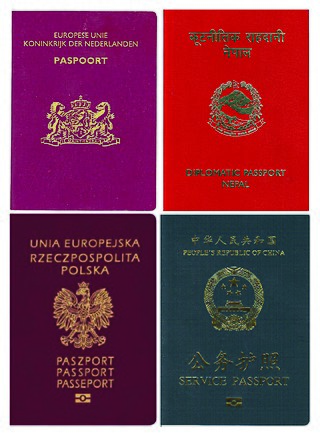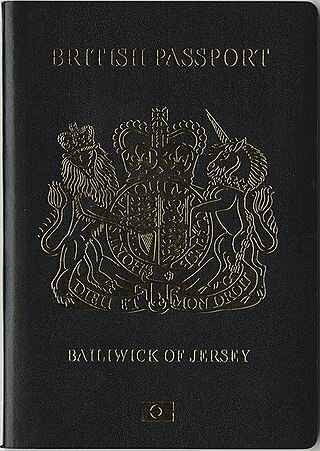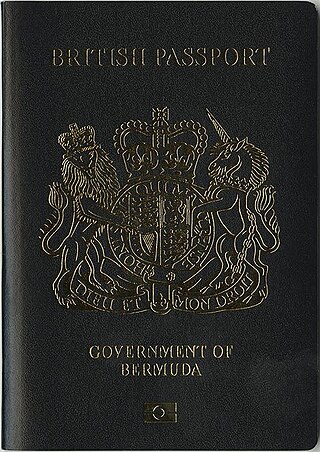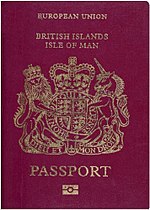
A passport is an official travel document issued by a government that contains a person's identity for international travel. A person with a passport can travel to and from foreign countries more easily and access consular assistance. A passport certifies the personal identity and nationality of its holder. It is typical for passports to contain the full name, photograph, place and date of birth, signature, and the issue and expiration dates of the passport. While passports are typically issued by national governments, certain subnational governments are authorised to issue passports to citizens residing within their borders.

The term "British subject" has several different meanings depending on the time period. Before 1949, it referred to almost all subjects of the British Empire. Between 1949 and 1983, the term was synonymous with Commonwealth citizen. Currently, it refers to people possessing a class of British nationality largely granted under limited circumstances to those connected with Ireland or British India born before 1949. Individuals with this nationality are British nationals and Commonwealth citizens, but not British citizens.

The British Nationality Act 1981 (c. 61) is an act of the Parliament of the United Kingdom concerning British nationality since 1 January 1983.

The Common Travel Area is an open borders area comprising the United Kingdom, Ireland, the Isle of Man and the Channel Islands. The British Overseas Territories are not included. Based on agreements that are not legally binding, the internal borders of the CTA are subject to minimal controls and can normally be traversed by British and Irish citizens with minimal identity documents. The maintenance of the CTA involves co-operation on immigration matters between the British and Irish authorities.

European Union citizenship is afforded to all nationals of member states of the European Union (EU). It was formally created with the adoption of the 1992 Maastricht Treaty, at the same time as the creation of the EU. EU citizenship is additional to, as it does not replace, national citizenship. It affords EU citizens with rights, freedoms and legal protections available under EU law.
The right of abode is an individual's freedom from immigration control in a particular country. A person who has the right of abode in a country does not need permission from the government to enter the country and can live and work there without restriction, and is immune from removal and deportation.

Belonger status is a legal classification normally associated with British Overseas Territories. It refers to people who have close ties to a specific territory, normally by birth or ancestry. The requirements for belonger status, and the rights that it confers, vary from territory to territory.

The primary law governing nationality of Ireland is the Irish Nationality and Citizenship Act, 1956, which came into force on 17 July 1956. Ireland is a member state of the European Union (EU) and all Irish nationals are EU citizens. They are entitled to free movement rights in EU and European Free Trade Association (EFTA) countries and may vote in elections to the European Parliament.

A British passport is a travel document issued by the United Kingdom or other British dependencies and territories to individuals holding any form of British nationality. It grants the bearer international passage in accordance with visa requirements and serves as proof of citizenship. It also facilitates access to consular assistance from British embassies around the world. Passports are issued using royal prerogative, which is exercised by His Majesty's Government; this means that the grant of a passport is a privilege, not a right, and may be withdrawn in some circumstances. British citizen passports have been issued in the UK by His Majesty's Passport Office, an agency of the Home Office, since 2014. All passports issued in the UK since 2006 have been biometric.

This article concerns the history of British nationality law.

The right of abode (ROA) is an immigration status in the United Kingdom that gives a person the unrestricted right to enter and live in the UK. It was introduced by the Immigration Act 1971 which went into effect on 1 January 1973. This status is held by British citizens, certain British subjects, as well as certain Commonwealth citizens with specific connections to the UK before 1983. Since 1983, it is not possible for a person to acquire this status without being a British citizen.
The Isle of Man is not part of the United Kingdom, but to a large extent its relations with other countries are handled by the United Kingdom.

The European Union itself does not issue ordinary passports, but ordinary passport booklets issued by its 27 member states share a common format. This common format features a coloured cover emblazoned—in the official language(s) of the issuing country —with the title "European Union", followed by the name(s) of the member state, the heraldic "Arms" of the State concerned, the word "PASSPORT", together with the biometric passport symbol at the bottom centre of the front cover.

The Gibraltar variant British passport is a British passport issued to British Citizens and British Overseas Territory Citizens who work or live in Gibraltar. Having Gibraltarian status alone, without being resident in Gibraltar, is insufficient to obtain a Gibraltar Passport. Gibraltar passports are issued by the Passport Office of the Gibraltar Civil Status and Registration Office. Since 2005, passports issued in Gibraltar have been biometric.

The primary law governing nationality in the United Kingdom is the British Nationality Act 1981, which came into force on 1 January 1983. Regulations apply to the British Islands, which include the UK itself and the Crown dependencies, and the 14 British Overseas Territories.

The Jersey-variant British passport is a type of British passport issued in the British Crown dependency of Jersey by the Passport Office in St Helier.

A Guernsey-variant British passport, also known as the Guernsey Passport, is a British passport issued to British citizens who are in the Bailiwick of Guernsey by the Passport Office of the Customs and Immigration Department in St Peter Port, Guernsey.

The British National (Overseas) passport, commonly referred to as the BN(O) passport, is a British passport for people with British National (Overseas) status. BN(O) status was created in 1987 after the enactment of Hong Kong Act 1985, whose holders are permanent residents of Hong Kong who were British Overseas Territories citizens until 30 June 1997 and had registered as BN(O)s.

The visa policy of Ireland is set by the Government of Ireland and determines visa requirements for foreign citizens. If someone other than a European Union, European Economic Area, Common Travel Area or Swiss citizen seeks entry to Ireland, they must be a national of a visa-exempt country or have a valid Irish visa issued by one of the Irish diplomatic missions around the world.

British passports previously issued by the Department of Immigration of the Government of the British Overseas Territory of Bermuda on behalf of His Majesty's Passport Office of the Government of the United Kingdom, differed from those issued in the United Kingdom and elsewhere in having "Government of Bermuda" added to the outside of the front cover, and the request from His Britannic Majesty's Secretary of State in the Name of His Majesty The King, which is printed on the inside of the cover of passports issued by the UK Government, replaced with the same request from the Governor of Bermuda as the competent authority in this behalf, in the Name of His Majesty The King.
















